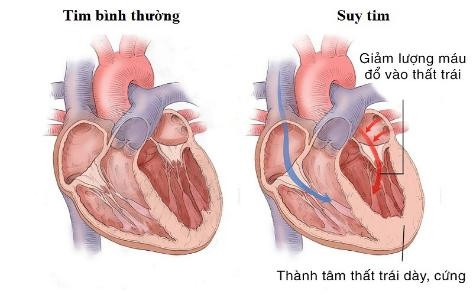How you live your daily life, what you eat, your level of physical activity, stress… have a significant impact on your risk of heart failure and other cardiovascular diseases.
Heart failure is a condition in which the heart is unable to pump enough blood to meet the body's needs, causing the patient to often have difficulty breathing, chest pain, fatigue, cough, edema... seriously affecting the quality of life. People with heart failure will face many potential risks, even life-threatening...
A healthy lifestyle such as regular physical activity, following a heart-healthy eating plan (such as the Mediterranean diet), maintaining a healthy weight and not smoking… has a positive impact on heart health and prevents heart failure.

Heart failure causes many dangerous complications.
1. Maintain a healthy weight to prevent heart failure
Being overweight or obese is a major risk factor for cardiovascular disease, including heart failure. Every extra pound can impede blood flow, putting pressure and strain on the heart.
Losing even a few pounds can make a big difference in preventing heart failure and improving overall heart health. Therefore, maintaining a healthy weight is important not only to prevent heart failure but also to prevent many other serious chronic diseases.
2. Exercise regularly
Regular physical activity helps prevent heart failure. People with heart failure should talk to their doctor to develop an exercise regimen that is right for them.
High-intensity interval training (HIIT), which alternates short bursts of intense exercise with more intense, less strenuous exercise, has been shown to strengthen and condition the heart, allowing it to work better.
The American Heart Association (AHA) recommends:
- Exercise at least 30 minutes a day (150 minutes a week), moderate intensity exercise, such as gardening, brisk walking, dancing...
- Or 15 minutes a day (75 minutes a week) of vigorous exercise, such as running, swimming, hiking uphill...
3. Follow a healthy diet
A heart-healthy diet includes:
Eat plenty of fresh fruits and vegetables at every meal;
Eat lean meat, skinless poultry…;
Moderate consumption of fish rich in healthy omega-3 fats;
Consume foods rich in monounsaturated fats, including nuts, seeds and olive oil; legumes; fiber-rich whole grains...
Limit saturated fat, trans fat, sodium, fat from red meat and other proteins, carbonated soft drinks, baked goods, and other foods and beverages high in added refined sugars...
4. Cut down on salt
High sodium in the diet can cause fluid retention in the body, which puts undue strain on the cardiovascular system. For people with high blood pressure, it is recommended to reduce the intake of salt, processed foods, and foods high in sodium such as bacon, ham, and snacks such as potato chips…
Follow the DASH (Dietary Approaches to Stop Hypertension) diet, which is based on fresh produce, daily servings of whole grains, low-fat dairy, lean meats, and limited sweets and fats. The goal is to reduce sodium intake to 2,300 milligrams (mg) per day, or 1,500 mg for people at high risk of high blood pressure.
5. Do not smoke
Smoking is a major cause of heart disease and stroke. Smokers are twice as likely to have a heart attack as non-smokers.
The chemicals in cigarettes can directly damage arteries and contribute to congestive heart failure. Secondhand smoke is equally harmful, as carbon monoxide can replace oxygen in the blood, forcing the heart to pump harder.
If you smoke, find a quitting method that is right for you, effective and safe.
According to Health and Life